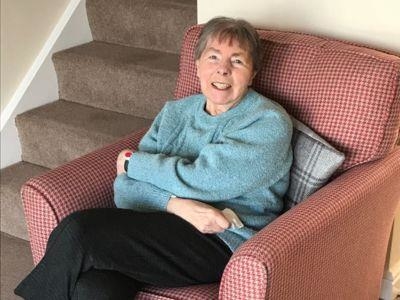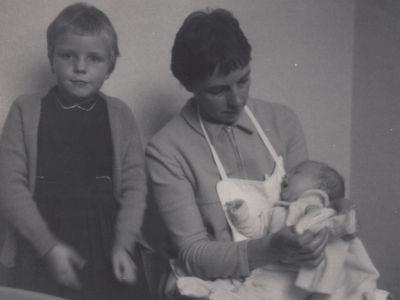Part 2: Caring for someone with a dual diagnosis of dementia and paranoid schizophrenia
- 8 May 2024
- 12 min read
This blog tracks living with and then caring for a mother with paranoid schizophrenia who was later diagnosed with mixed dementia and latterly Alzheimer’s disease. It is a personal story, but it also references studies and useful links that are relevant to the blog. Each person’s account of caring for someone with dementia is unique.
Hopefully some of this blog will be recognisable to other carers, and for researchers perhaps it might confirm your thoughts, spark debate, or inspire ideas for future and current research. The references are only a snapshot of research and other useful information to help me and hopefully others to understand what I and my mother have lived with during our lifetime. All comments and questions welcome.
Contact: helen.sloan@nihr.ac.uk
Part 2: Living independently at home as dementia progressed
Read Part 1: The dual diagnosis of paranoid schizophrenia and dementia
Part 3: Living in a Care Home coming shortly

Mum was not always defined by her diagnosis, although it stopped her from doing so many things that I suspect she would have liked to do. She loved music and art and took me to my first major art gallery, the Louvre in Paris. I was so engrossed by the paintings and sculpture that it began a lifelong love of visiting museums and galleries. I studied History of Art at university and my profession for nearly thirty years was as a curator, which I owe in some part to mum. She was a trained nurse and a trainer of nurses, a dedicated mother, housekeeper, gardener, animal lover, DIY enthusiast, and I discovered later in her life had a wicked sense of humour. Mum lived a simple life but her passion for music and art shone through in her CD collection (she never had a computer, tablet, or smartphone) and choice of pictures. She continued to keep her house meticulously well into her presentation of dementia.
After mum’s last admission to hospital in 2013, she was placed on a Community Treatment Order (CTO) allowing her to live at home as long as she fulfilled certain conditions such as staying on her medication and attending appointments. She had been on CTOs many times and usually broke the terms of them. Her care coordinator in the Community Mental Health Team (CMHT) on this occasion laminated the conditions and put them by the side of the telephone. They were not really needed following this admission to hospital as mum became compliant with her treatment and treated her care coordinators and social workers as part of her family. Her obsession with a local solicitor and her perception of local hostility began to decline and there was a period when mum went out a bit more. While she still refused a lot of help and trips out, we frequently went for lunches at a local café or pub which made me feel a little like we were a regular family. The one thing I did insist on buying her was a microwave. While the CMHT were a little reticent about talking about dementia, I discussed practical things such as cooking and how we could keep mum at home for as long as possible. There were a few things like learning to use a mobile phone and a microwave that I felt compelled to teach mum before she lost her cognitive ability. I also had a Lifeline alarm installed in her home but getting her to wear the bracelet and pendant that recorded falls was an ongoing game for both her care coordinator and me.
It was agreed that mum would be provided with a care package to help her with household chores, cleaning (she never let anyone do that until later on) and general care. Mum was so resistant at first but as the dementia progressed she allowed people to help and again became friends with them.
Although mum would not acknowledge that she had any illness, she began to get her affairs in order. In 2014, she took me to the bank to allow me third party access to her accounts and then decided that sorting out her will and giving me Lasting Power of Attorney (LPA) was a good idea. This shocked me as mum had been so mistrustful of me in the past. The LPA became invaluable and I was so grateful that it had been put in place – it helped me to provide for her and make decisions about her care in her later stages of life. I also had some difficult conversations with her such as whether she would like to be resuscitated if needed.

About two years later mum felt unable to go shopping and I started to have groceries delivered. I tried to vary what she got but she always insisted that I went back to buying tried and tested products. The microwave became more and more important in her life as we transitioned into buying ready meals. She never did master the mobile telephone.
Mum’s narrative shrank from the town to her flat with ‘the graduates’ putting poison and drugs in her water. I asked her if she wanted me to get bottled water, but she declined. If anything went wrong, it was ‘the graduates’ and the neighbours were complicit. She lived a very isolated life from 2016 going out only to the bins and to go for lunches with the family when I came up. She began to lose her confidence and I remember the last time we went out while she lived at home, mum would only eat ice cream. I remember feeling sadness as I saw her struggle.
The graduates had a lot to answer for. The battery on my mum’s smoke alarm was running out and it beeped every twenty minutes for three weeks until I came up to fix it, but mum said it was the graduates. Mum would only sleep on top of the bed because of the graduates. I bought her a duvet to make getting in and out of bed easier, but she put it back in its box. I used to find jars of coffee, chocolates and loo roll in the wardrobe (on the few occasions she would let me look in there) all hidden from the graduates. Money and important documents were kept under her pillow. I wondered what went through her mind and how frightening it must have been sharing her world with those malevolent graduates. On one occasion, my mum reported being assaulted by someone while she was in bed. I felt that regardless of her delusions, I needed to take it seriously and mum’s care coordinator reported the incident. The police spoke to me and politely but firmly told me that she was an old woman with dementia and the likelihood was that nothing happened. I generally agreed with them but did point out that there must be some incidents that are overlooked on those grounds.

I started a new job in January 2018. On my first day of the new job, I got a call saying that my mum had had a fall. She was taken to hospital and it turned out that she had had a TIA (Transient Ischaemic Attack). I drove three hundred miles, took time off work, and took mum for an MRI (Magnetic Resonance Imaging) scan. It was confirmed that the TIA was linked to dementia. This made the dementia very real to me although I had witnessed it in so many ways to date. I spoke with mum’s social worker, and they suggested that I put her in a specific care home. I went to visit and could not face my mum living there even though it was designed for people with dual mental health and dementia issues. I asked if we could postpone a move and explained that my mum was not a great TV watcher and every room had one in that care home. She agreed and increased mum’s care package to four visits a day and asked me to look at some care homes that would be more suitable.
Over the next year, mum went into further decline. She stopped putting out the rubbish and relied on carers to do everything for her. None of us were allowed near her bed ever since I had tried to buy a duvet – she wanted no more attempts to change that. She insisted that she was fine and could make the bed herself. I always wondered what would tip us into the realm of entering a care home. Mum stopped putting milk in the fridge and regularly drank coffee with sour milk in spite of the best of efforts of those around her. The culmination was her lack of acceptance that her false teeth were not fixed, and as a consequence she did not clean them regularly. She would only allow men to remove them leaving two carers and my partner as the only people who on occasion could remove and clean the teeth. Mum had another fall (these were becoming more regular) and was taken to hospital with a suspected stroke. Although mum was now wearing her pendant and bracelet from lifeline, she did not understand how it worked and talked of the lovely voices in the corner of the room. The stroke turned out to be a mouth infection caused by long-term non-removal of teeth. At this point, I felt it was time for mum to go into a care home. So that was the defining reason to become a resident of a care home – one I had never even considered.

We had mum on a waiting list for two dementia friendly homes, but no places had come up in spite of my regular calls. I had to act very quickly this time. My tour of the local care homes was so depressing, and I felt that with so many I could not possibly leave mum in them. Eventually I found one with a nice garden and friendly staff. A date was set and I discussed it with the care home manager and the social worker. We talked about how to approach admission and the social worker said that she would get an emergency DoLS (Deprivation of Liberty Safeguarding authorisation) before a standard one was put in place. I had tried and tried to show mum care homes without success. It was agreed that I would take her for a run in the car (a challenge in itself) and take her to the care home. I also asked her favourite carer if he would accompany her. I felt terrible deceiving her. On arrival she asked where she was, and I showed her to her room. It did not go down well, and she kept saying ‘Why? I’ve done nothing wrong!’ She thought she was being sectioned again. The care manager said it was best if I left and to return later. The carer who was close to her cried as I gave him a lift back to his office, and I could not stop talking about what an awful way to have to treat someone, how awful I felt and that it was the story of her life to be incarcerated. I did manage to thank the carer as I dropped him off – he had gone the extra mile – but I was focused on mum and my guilt. It was honestly the worst day of my life.
Relevant research and information
Mental Health Act and Community Treatment Orders
Mind (2022) ‘Community Treatment Order.’
https://www.mind.org.uk/information-support/legal-rights/community-treatment-orders-ctos/about-ctos/ [Accessed 28/03/2024]
Enabling people to remain at home longer with dementia
Alzheimer’s Society, Living Alone as a Person with Dementia (2022) [Online]
https://www.alzheimers.org.uk/get-support/staying-independent/living-alone [Accessed 26/03/2024]
Redley, M., Poland, F., Coleston-Shields, D., M., Stanyon, M., Yates, J., Streater, A., and Orrell, M. (2022) ‘Practitioners’ Views on Enabling People With Dementia to Remain in Their Homes During and After Crisis.’ Journal of Applied Gerontology 41(12) pp. 2549 – 2556
Leverton, M. and Pui Kin Kor, K., (2023) ‘Supporting People with Dementia to Live at Home.’ BMC Geriatrics 23(681) [Online] https://doi.org/10.1186/s12877-023-04389-w [Accessed 26/03/2024]
Learning and relearning basic and technology skills with mild dementia
Kerkhof, Y.J.F., Bergsma, O.A., Mangarancina, F., Planting, C.H.M., Graff, M.J.L. and Dröes, R.M., (2021) ‘Are People with Mild Dementia Able to (Re)Learn How to use Techonology? A Literature Review.’ International Psychogeriatrics 34(2) pp. 113 – 128
De Werd, M.M.E., Boelen, D., Olde Rikkert, M.G.M., and Kessels, R.P.C., (2013) ‘Errorless Learning of Everyday Tasks in People with Dementia.’ Clinical Interventions in Aging 2013(8) pp. 1177 - 1190
Change of schizophrenia in aging and dementia
Adamowicz, D.H., and Lee,E.E., (2023) ‘Dementia Among Older People with Schizophrenia: An Update on Recent Studies.’ Current Opinions in Psychiatry 36(3) pp. 150 - 155
I can find very little and nothing that is fully relevant on the relationship between presentation in comorbid schizophrenia and dementia as the stages of dementia change.
TIA and dementia
Tariq, S., d’Esterre, C.D., Sajobi, T.T., Smith, E.E., Longman, R.S., Frayne, R., Coutts, S.B., Forkert, N.D. and Barber, P.A (2018) ‘A longitudinal magnetic resonance imaging study of neurodegenerative and small vessel disease, and clinical cognitive trajectories in non demented patients with transient ischemic attack:the PREVENT study.’ BioMed Central Geriatrics 28:163
Wardlaw, J.M., Doubal F.., Brown, R., Backhouse, E., Woodhouse L., Bath P., Quinn T.J., Robinson, T., Markus, H.S. , McManus,R., O’Brien, J.T., Werring, D.J., Sprigg, N., Parry-Jones A., Touyz, R.M., Williams,S., Mah, Y-H., Emsley,H. and the R4VaD Investigators (2021) ‘Rates, risks and routes to reduce vascular dementia (R4Vad), a UK wide multicentre prospective observational cohort study of cognition after stroke: Protocol’ European Stroke Journal 6(1): 89 – 1010
Mid and late stage dementia: the challenges
Feast, A., Orrell, M., Charlesworth, G., Melunsky, N., Poland, F. and Mariz-Cook, E., (2016) ‘Behavioural and Psychological Symptoms in Dementia and the Challenges for Family Carers: A Systematic Review.’ The British Journal of Psychiatry 208 pp. 429 - 434
Getting into and choosing care homes
Age UK (2022) ‘Choosing the Right Care Home for You’ [Online]
https://www.ageuk.org.uk/information-advice/care/arranging-care/care-homes/choosing-care-home/ [Accessed 26/03/2024]
Useful legislation and preparing for lack of capacity in dementia
Social Care Institute of Excellence (online accessed 26/03/2024)
DoLS at a glance
https://www.scie.org.uk/mca/dols/at-a-glance/
LPA
https://www.scie.org.uk/mca/practice/representing-the-person/lasting-power-of-attorney/
Age UK
Advance Decisions, advance statements and living wills
https://www.scie.org.uk/mca/practice/representing-the-person/lasting-power-of-attorney/
Guilt when putting relatives in care homes
Alzheimer’s Society [n.d.] [Online]
https://www.alzheimers.org.uk/get-support/help-dementia-care/care-homes-who-chooses [Accessed 26/03/2024]
Robinson R. and Fisher, A. (2024) ‘Experiences of Moving an Older Parent into a Care Home or a Nursing Home in the UK: A Qualitative Study.’ Current Psychology 43 pp. 2981 - 2992

Helen Sloan is Public Contributor in National Institute for Health and Care Research for Clinical Research Network Wessex, Clinical Research Network Coordinating Centre, Research Support Services, Applied Research Collaboration Wessex Mental Health Hub, Join Dementia Research Programme Board, and Be Part of Research Advisory Group. She is the Clinical Trials Group at University of Southampton. She worked as a curator of art, science and technology collaborations for nearly thirty years before gaining an MSc in Psychology and training to be a Mental Health, Mental Capacity and Care Act Advocate and trainer.
If you have a diagnosis of dementia, are a carer for someone with dementia, or an interested person with no diagnosis, there are studies available for you to talk part in. Add your name to the Join Dementia Research (JDR) list and you will be sent opportunities to be involved in research with the potential to make long-term impact on treatments and the search for a cure for dementia.


